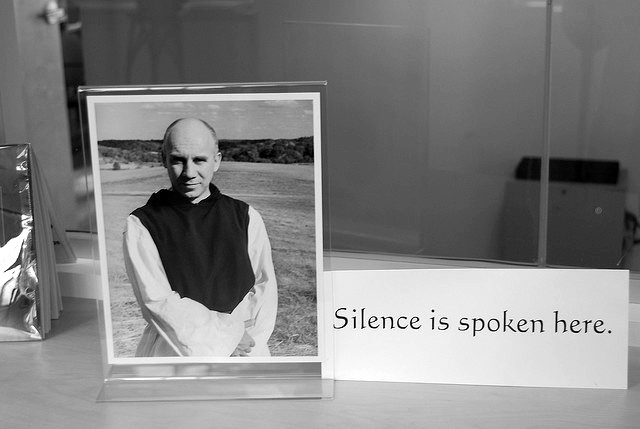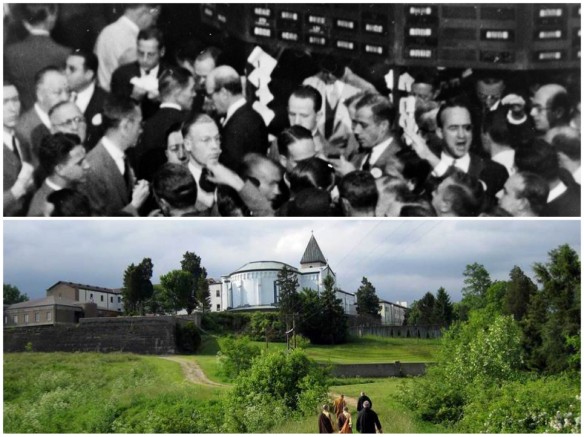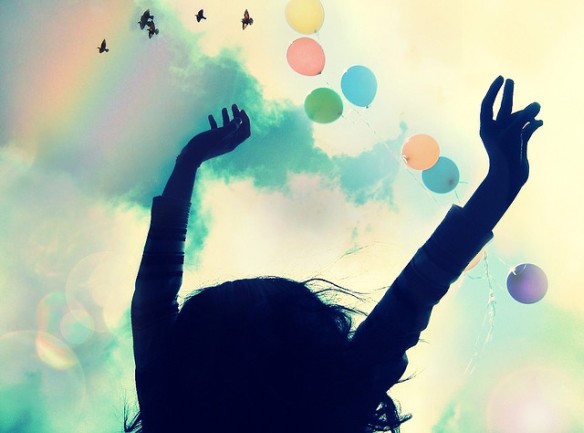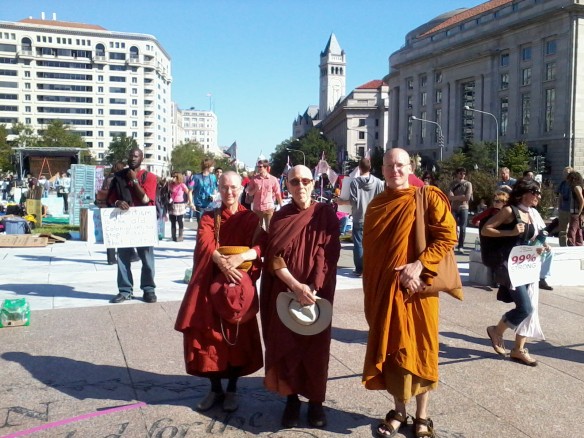
Venerables Bhikkhu Bodhi, Ajahn Guna, and Sister Santussika in Washington DC
After the Buddhist Global Relief (BGR)
Walk to Feed the Hungry in South Bay CA, I was invited to spend time with Venerable Bhikkhu Bodhi at his residence in Chuang Yen Monastery, Carmel, NY. There were BGR meetings about to take place and were interested in having more Buddhist monastics involved in their programs. I accepted, and someone donated their frequent flier miles to fly me to the meetings, which were very beneficial. By having the chance to meet the board and hear more about the projects they are doing to relieve suffering in the world, I was inspired. Of course, this time of inspiration was a opportune moment for them to ask me if I would accept the position as the BGR Representative of Northern California, which I did at the request of Ven. Bhikkhu Bodhi. As the organization grows, there is the need to give talks, information, and coordinate events which are in line with the mission of BGR.
As I had recently given a speech about the need for spiritual leaders of all faiths to work together to inspire the faith of the masses to address the grave issues that threaten our planet and civilization, it felt right to “walk the talk” by accepting.
A day before I was ready to get on a plane for my return to Berkeley Buddhist Monastery, which is a nice place to return to, Ven. Bhikkhu Bodhi encouraged me to attend another gathering he was invited to in Washington D.C. called Stop the Machine! Create a New World! October 2011. Rabbi Micheal Lerner was scheduled to speak, and the hope that spiritual people would help bring wisdom to the event was in the air. As I had recently given a speech about the need for spiritual leaders of all faiths to work together to inspire the faith of the masses to address the grave issues that threaten our planet and civilization, it felt right to “walk the talk” by accepting.
Before going, I was curious as to what I was getting into, as I have never been an activist type, never have been arrested, never had gone to an event like this before ordination or after; I thought I would tune in to the current events nearby. Just about 90 minutes from my room in NY was the stage of the Occupy Wall Street Protests, in which over 1,000 people had been arrested (at that point). Read More …
[Berkeley Buddhist Monastery will be offering a series of Sunday evening classes using Dhamma with modern issues led by Ajahn Guna. It will be a blend of modern documentaries, walking meditation, discussion, reflection, and other spiritual tools such as chanting.]
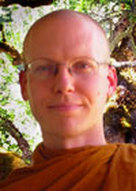
Ajahn Guna
I have devoted my life to the study and practice of the teachings of the Buddha and find that if there is not a strong framework such as the Dhamma used while receiving information about current events—the mind is not peaceful or able to produce positive results. If Buddhism was not relevant to current events, then I would choose a different path! Just being an “armchair Buddhist” who has read a lot but doesn’t take the teachings into practice always looked like a boring way to go. The more clarity we can gain about the Buddha’s teaching and how it applies to our modern life, the happier we are for many reasons. Read More …
[This is the second of a series of posts reflecting on how I found myself drawn to monasticism despite (or perhaps because of) my upbringing in the Bay Area and providing insight into how the relatively secular environment in which I grew up prompted me to look deeper into the meaning of life.]
Audio clip: Adobe Flash Player (version 9 or above) is required to play this audio clip. Download the latest version here. You also need to have JavaScript enabled in your browser.
Reading by Shramanera Chin Wei. Click the arrow on the audio player above for the audio. You can also download the recording.
Spiritual nakedness [without masks] is far too stark to be useful. It strips life down to the root where life and death are equal, and this is what nobody likes to look at. But it is where freedom really begins–the freedom that cannot be guaranteed by the death of somebody else. The point where you become free not to kill, not to exploit, not to destroy, not to compete, because you are no longer afraid of death or the devil or poverty or failure. If you discover this nakedness, you’d better keep it private. People don’t like it. But can you keep it private? Once you are exposed… Society continues to do you the service of keeping you in disguises, not for your comfort, but its own.
-Thomas Merton, Learning to Live
… words that cut right to the heart of things, not with the blade of cynicism and satire, but with clarity and compassion.
The writings of Thomas Merton, Master Hua, and Ajahn Sumedho struck a chord with me. Somehow, while reading them, I knew what I was reading were “true words”–words that cut right to the heart of things, not with the blade of cynicism and satire, but with clarity and compassion. Merton revealed life in its bareness and simplicity, removing the pride, the show, the falseness.
The Buddhist teaching of Great Compassion links all beings together as one family, as “one substance.” I remember reading a poem by Master Hua: Read More …
[This is the beginning of a series of posts reflecting on how I found myself drawn to monasticism despite (or perhaps because of) my upbringing in the Bay Area and providing insight into how the relatively secular environment in which I grew up prompted me to look deeper into the meaning of life.]
Audio clip: Adobe Flash Player (version 9 or above) is required to play this audio clip. Download the latest version here. You also need to have JavaScript enabled in your browser.
Reading by Shramanera Chin Wei. Click the arrow on the audio player above for the audio. You can also download the recording.
One day in my high school Economics class the teacher showed us a video about a Trappist monastery, so as to give us a chance to see an “economic system” different from the one we were used to in suburban America. The Trappists didn’t live in a capitalistic or consumer framework. They based their lives on sufficiency and simplicity; in fact, they took a vow of poverty.
I realized that what the Trappist monks were saying was what my heart was saying to me.
Suddenly I had an epiphany–but not an epiphany relating to how another “economic system” worked. Rather, I realized that what the Trappist monks were saying was what my heart was saying to me. They were attempting to live a simple, humble life dedicated to God and in full accord with Biblical teachings. I was quite struck by that.
As early as middle school, I remember wondering about my purpose in life. But, in the hormones and emotions of adolescence, this search became dormant, only to reappear around junior year in high school. At that time, I began reflecting on what I was really doing with myself as the things that society put forth as worthwhile seemed rather meaningless. Read More …
I was raised without religion. My parents are rational, intellectual, and basically atheist – one comes from a vaguely Christian family, the other from a slightly Jewish one, and they never really made anything of it. They are both professors; they don’t believe, they think. So I had to wonder what they would make of my interest in Buddhism, and this blog.
But what really stuck was the bit about God being inside of me – me! I found this extremely appealing….
This isn’t the first time that I’ve strayed a little from their secular perspective on things. When I was four or five, I went through a bit of a God-curious phase, which my parents put up with amiably enough. I had a Christian babysitter who told me that the Lord was everywhere, even inside of me. Probably, her main point had to do with not thinking I could get away with something just because she didn’t see me do it, because God always knows. But what really stuck was the bit about God being inside of me – me! I found this extremely appealing – it may have confirmed something that I had already suspected. At home that evening, according to my parents, I/God was very excited to tell them what I’d learned, and also to demonstrate: “God is standing on one foot. God is jumping on the couch. God is doing ballet!” Read More …
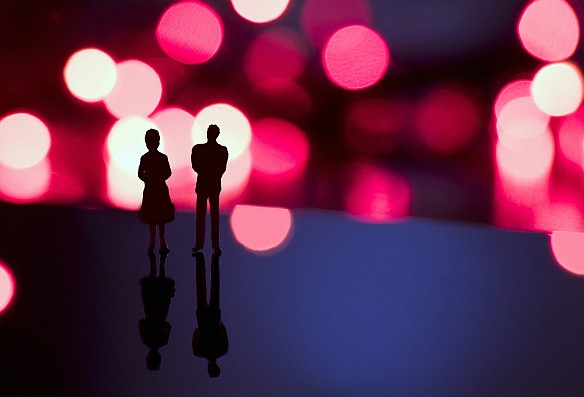
We are a lost generation, desperately clinging to anything that feels real, but too afraid to become it ourselves. We are a defeated generation, resigned to the hypocrisy of those before us, who once sang songs of rebellion and now sell them back to us. We are the last generation, a culmination of all previous things, destroyed by the vapidity that surrounds us. The hipster represents the end of Western civilization—a culture so detached and disconnected that it has stopped giving birth to anything new.
Douglas Haddow’s Hipster: The Dead End of Western Civilization
Not so fast. You are not lost in a sea of personal fragmentation, social virtual irrelevance, or economic meaninglessness, living in a poisoned, dying world of ignorance and symbolic incoherence. The hip ironic cynicism that made everyone’s narcissistic projections of their God-like qualities immune from criticism has turned into a chaotic uncontrollable flow of disconnected emotions. Without a coherent narrative to hold together the constantly changing and inherently unstable perceptions and projections that makes up our conscious experience, everyone is feeling lost.
Watch out! There was another moment like this, not long ago, in the 60’s—a moment of extreme freedom, free from dominating narratives.
Watch out! There was another moment like this, not long ago, in the 60’s—a moment of extreme freedom, free from dominating narratives. A moment of apparent freedom, euphoric! A rush of libido fueled by sex when you feel like it, drugs that freed your inhibitions, music that vibrated deep in your body, and community that seemed to embody new values and meanings. What happened is a cautionary tale that is now wrapped up in nostalgia and decades of dead time in the frantically inspired trenches of capitalism. Read More …
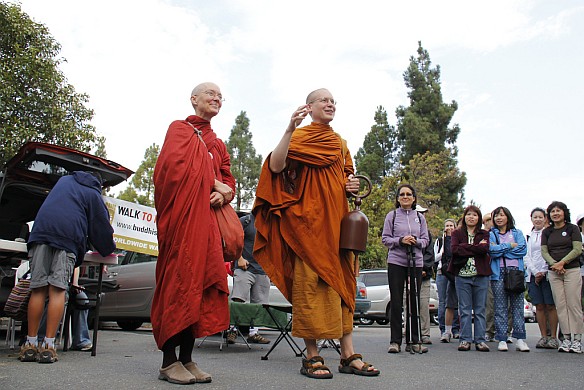
Starting the walk in the morning at San Jose
[Admin’s note: Buddhist Global Relief just hosted a 18-mile peace walk from San Jose to Palo Alto, CA on Sept 11, 2011, ten years after 9/11. Ajahn Guna, a Theravada monk living in Berkeley Buddhist Monastery led the walk and many members of the Berkeley community joined the walk. The event was quite successful with over 200 participants. This was the speech Ajahn Guna gave after lunch.]
Today’s walk, is a walk of compassion, and I am glad to see so many people here who are bringing their practice to the important issues we must face in the world today.
Can we try to put ourselves in someone else’s shoes? Who wants to really understand the suffering of others….
Venerable Bhikkhu Bodhi has explained that compassion, or karuna in Pali–the canonical language of Theravadin Buddhism, is a quality of mind which is a divine abiding– which sympathizes, empathizes, and cares about the suffering that oneself and others experience. Can we try to put ourselves in someone else’s shoes? Who wants to really understand the suffering of others, or the obvious suffering in our own lives–rather than distracting ourselves with sense pleasures?
There are two Pali words that are translated as compassion: karuna and anukampa — karuna being the feeling of compassion that we experience in meditation, and anukampa refers to a trembling of the heart that moves us to act on behalf of others. I would say that this Walk to Feed the Hungry is more like anukampa. As we can see there is increasing suffering in the world, the causes and conditions for terrorism, corruption of governments, perpetual wars, destruction of the environment, and the breakdown of families. These are issues of morality which spiritual people need to stand up to. Read More …
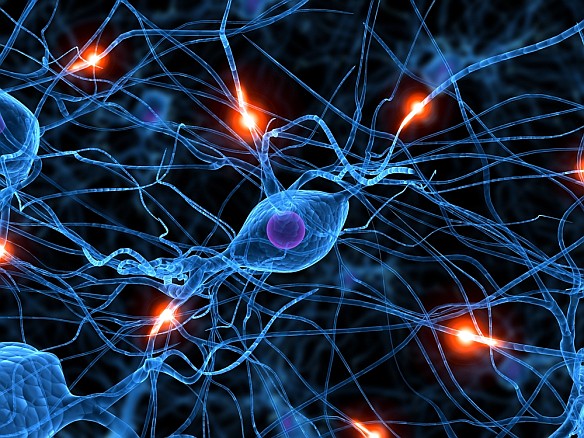
…we are deeply driven by biological impulses and genetic predispositions, heavily programmed…. But …it is possible to learn how to better understand and direct our own minds, and to overcome some of our programming.
After reading an earlier post in which I wondered what my subconscious might be doing behind my back, a friend sent me a copy of Incognito: The Secret Lives of the Brain, a new book by neuroscientist David Eagleman. Though he does not intentionally draw any connections to Buddhism, Eagleman makes two major points that seem to parallel the Buddhist conception of the human mind. First, he argues that beneath the surface of our conscious thoughts, the vast and unexplored subconscious quietly exerts its influence at every moment. We may feel that we’re independently making judgments, forming opinions and choosing certain actions and not others, but in fact, we are deeply driven by biological impulses and genetic predispositions, heavily programmed to tend in certain directions. But Eagleman also shows that it is possible to learn how to better understand and direct our own minds and to overcome some of our programming. Recent advances in neuroscience reveal the brain to be much more elastic and flexible than we once thought.
“It is something like a young monarch who inherits the throne and takes credit for the glory of the country—without ever being aware of the millions of workers who keep the place running.”
The conscious self, Eagleman says, is “the smallest bit-player” in the theater of the brain, which nevertheless considers itself the star: “It is something like a young monarch who inherits the throne and takes credit for the glory of the country—without ever being aware of the millions of workers who keep the place running.” He provides example after example of how this is true, showing how our senses can deceive us, how we are influenced by cues that we don’t even notice, and how small changes in the brain can greatly alter our perceptions, actions, and personalities. Each of us may feel ourself to be a discrete and independent entity, but we are in fact a multitude of driving forces, which are often in competition with one another—and the more neuroscientists learn, the more complex the brain seems to be. Read More …

 SHARE
SHARE EMAIL
EMAIL COMMENT0 comments
COMMENT0 comments 

